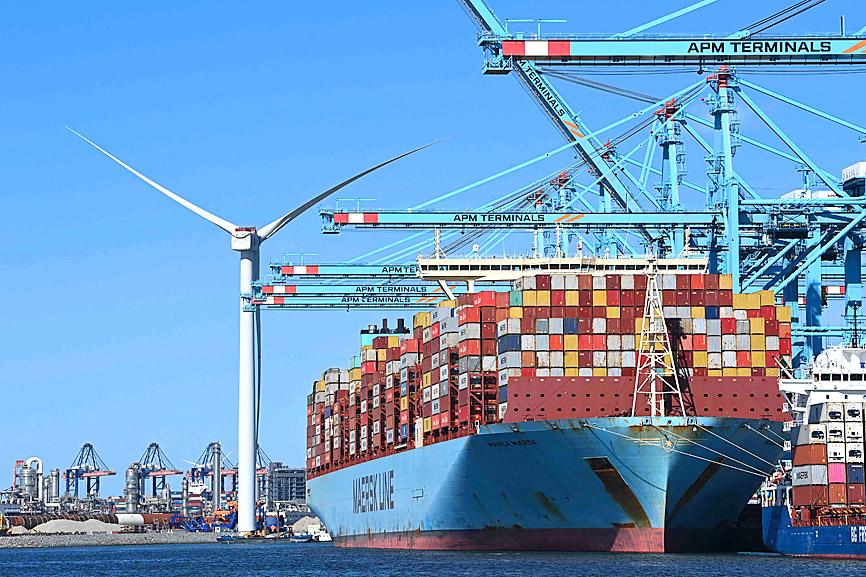A.P. Moller Maersk A/S yesterday raised its profit forecast for the second time this year after congestion on trade lanes boosted global freight rates, creating an “exceptional market” for transport companies.
Maersk, which controls about one-sixth of the world’s container trade, and its peers have benefited from supply-line disruptions as a shortage of shipping capacity has enabled them to charge higher prices for their services.
Hapag-Lloyd AG, the world’s fifth-largest shipping line, on Thursday raised its profit forecast, saying average freight rates have been about 80 percent higher in the first half of this year.

Photo: AFP
Underlying earnings before interest and tax would be about US$31 billion this year, Maersk said. That compares with a previous forecast of about US$24 billion and an average estimate of US$28.4 billion in a Bloomberg survey of analysts.
“Congestion in global supply chains leading to higher freight rates has continued longer than initially anticipated,” the Copenhagen-based company said. “The strong result is driven by the continuation of the exceptional market situation.”
Maersk is due to publish its second-quarter report today.
The company’s underlying earnings before interest, tax, depreciation and amortization would be about US$37 billion this year, up from about the US$30 billion seen previously, and free cash flow this year would be above US$24 billion, up from a previous forecast of above US$19 billion, it said.
“The average container rate still remains significantly above historical levels, which bodes well for the profit outlook for 2023,” Danske Bank credit analyst Brian Borsting said in a note. “Macro uncertainty and a high container order book are main risks.”

Real estate agent and property developer JSL Construction & Development Co (愛山林) led the average compensation rankings among companies listed on the Taiwan Stock Exchange (TWSE) last year, while contract chipmaker Taiwan Semiconductor Manufacturing Co (TSMC, 台積電) finished 14th. JSL Construction paid its employees total average compensation of NT$4.78 million (US$159,701), down 13.5 percent from a year earlier, but still ahead of the most profitable listed tech giants, including TSMC, TWSE data showed. Last year, the average compensation (which includes salary, overtime, bonuses and allowances) paid by TSMC rose 21.6 percent to reach about NT$3.33 million, lifting its ranking by 10 notches

Popular vape brands such as Geek Bar might get more expensive in the US — if you can find them at all. Shipments of vapes from China to the US ground to a near halt last month from a year ago, official data showed, hit by US President Donald Trump’s tariffs and a crackdown on unauthorized e-cigarettes in the world’s biggest market for smoking alternatives. That includes Geek Bar, a brand of flavored vapes that is not authorized to sell in the US, but which had been widely available due to porous import controls. One retailer, who asked not to be named, because

SEASONAL WEAKNESS: The combined revenue of the top 10 foundries fell 5.4%, but rush orders and China’s subsidies partially offset slowing demand Taiwan Semiconductor Manufacturing Co (TSMC, 台積電) further solidified its dominance in the global wafer foundry business in the first quarter of this year, remaining far ahead of its closest rival, Samsung Electronics Co, TrendForce Corp (集邦科技) said yesterday. TSMC posted US$25.52 billion in sales in the January-to-March period, down 5 percent from the previous quarter, but its market share rose from 67.1 percent the previous quarter to 67.6 percent, TrendForce said in a report. While smartphone-related wafer shipments declined in the first quarter due to seasonal factors, solid demand for artificial intelligence (AI) and high-performance computing (HPC) devices and urgent TV-related orders

Prices of gasoline and diesel products at domestic fuel stations are this week to rise NT$0.2 and NT$0.3 per liter respectively, after international crude oil prices increased last week, CPC Corp, Taiwan (台灣中油) and Formosa Petrochemical Corp (台塑石化) said yesterday. International crude oil prices last week snapped a two-week losing streak as the geopolitical situation between Russia and Ukraine turned increasingly tense, CPC said in a statement. News that some oil production facilities in Alberta, Canada, were shut down due to wildfires and that US-Iran nuclear talks made no progress also helped push oil prices to a significant weekly gain, Formosa said